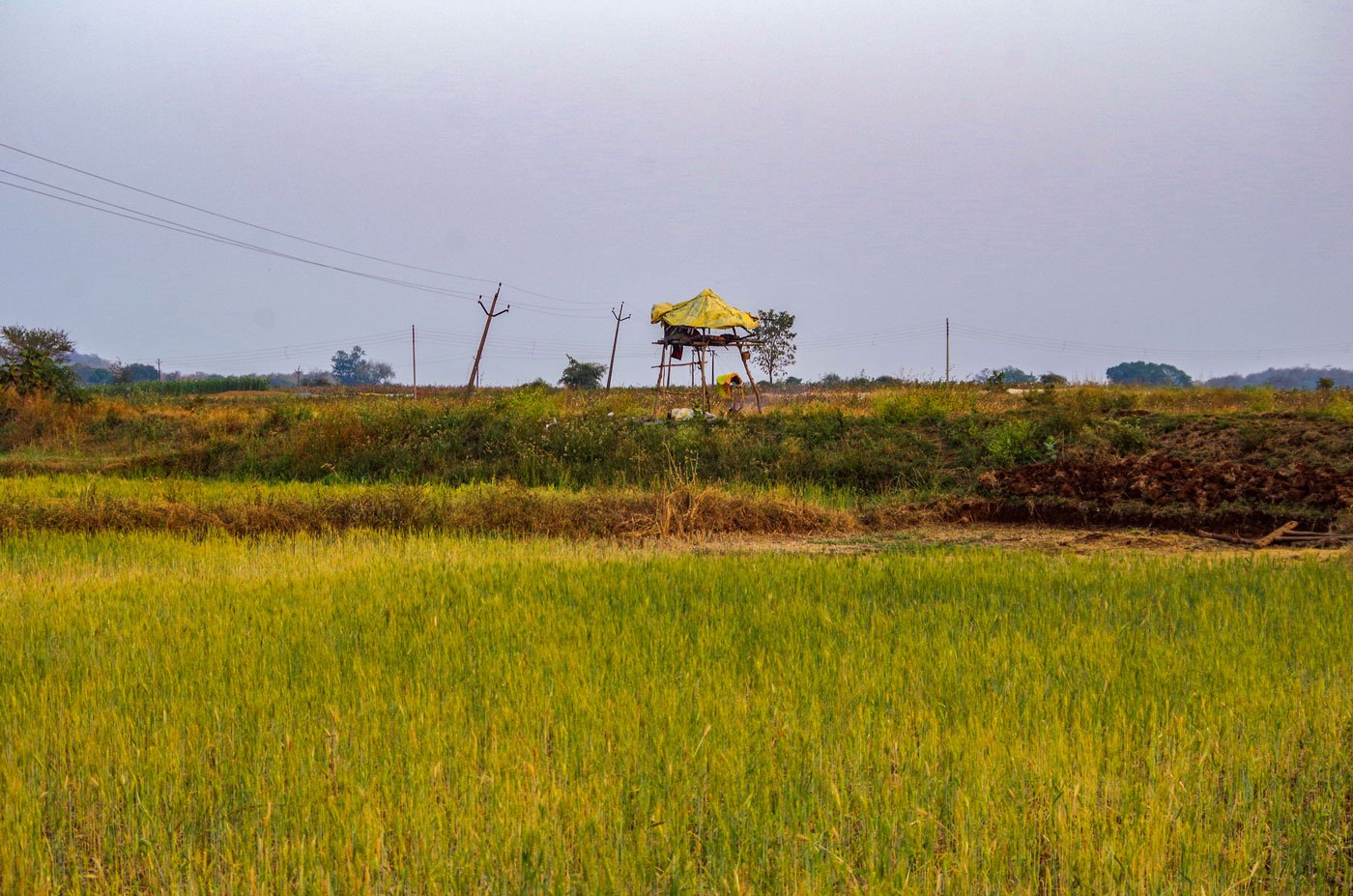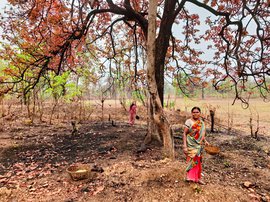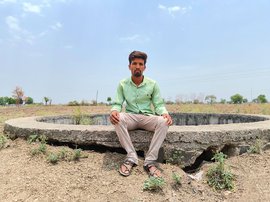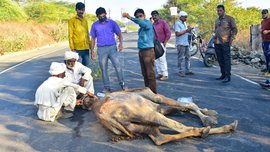It’s 6 p.m. on February 28, 2023. As the sun sets on the picturesque Kholdoda village, Ramchandra Dodake, 35, gears up for the long night ahead. He checks his long-range, high-powered ‘commander’ torch and readies his bedding.
Inside their modest house, his wife Jayashree is making dinner – dal and a mixed-vegetable curry. Next door, his uncle Dadaji Dodake, 70, is also busy preparing for the night. His wife, Shakubai is cooking rice – a scented variety that the couple grow on their farm – and making chapatis.
“We’re almost set,” the 35-year-old tells me. “Once our food is ready, we will leave.” Jayashree and Shakubai will pack this dinner for us, he adds.
Dadaji and Ramchandra, two generations of the Dodakes who belong to the Mana community (listed as a Scheduled Tribe in the state), are my hosts today. The former is a keertankar , a devout follower of Babasaheb Ambedkar, and a farmer himself; the latter takes care of the family farm of five acres as his father, Bhikaji – Dadaji’s elder brother – is too sick to farm anymore. Bhikaji was once the village ‘Police Patil’, a key post that acts as a liaison between the village and the police.
We are preparing to leave for Ramchandra’s farm a couple of miles away from the village in Bhiwapur tehsil of Nagpur district, for what they call jagli , or night vigil, to guard their standing crops from wild animals. Ramchandra's older son, nine-year-old Ashutosh is in our group of seven.
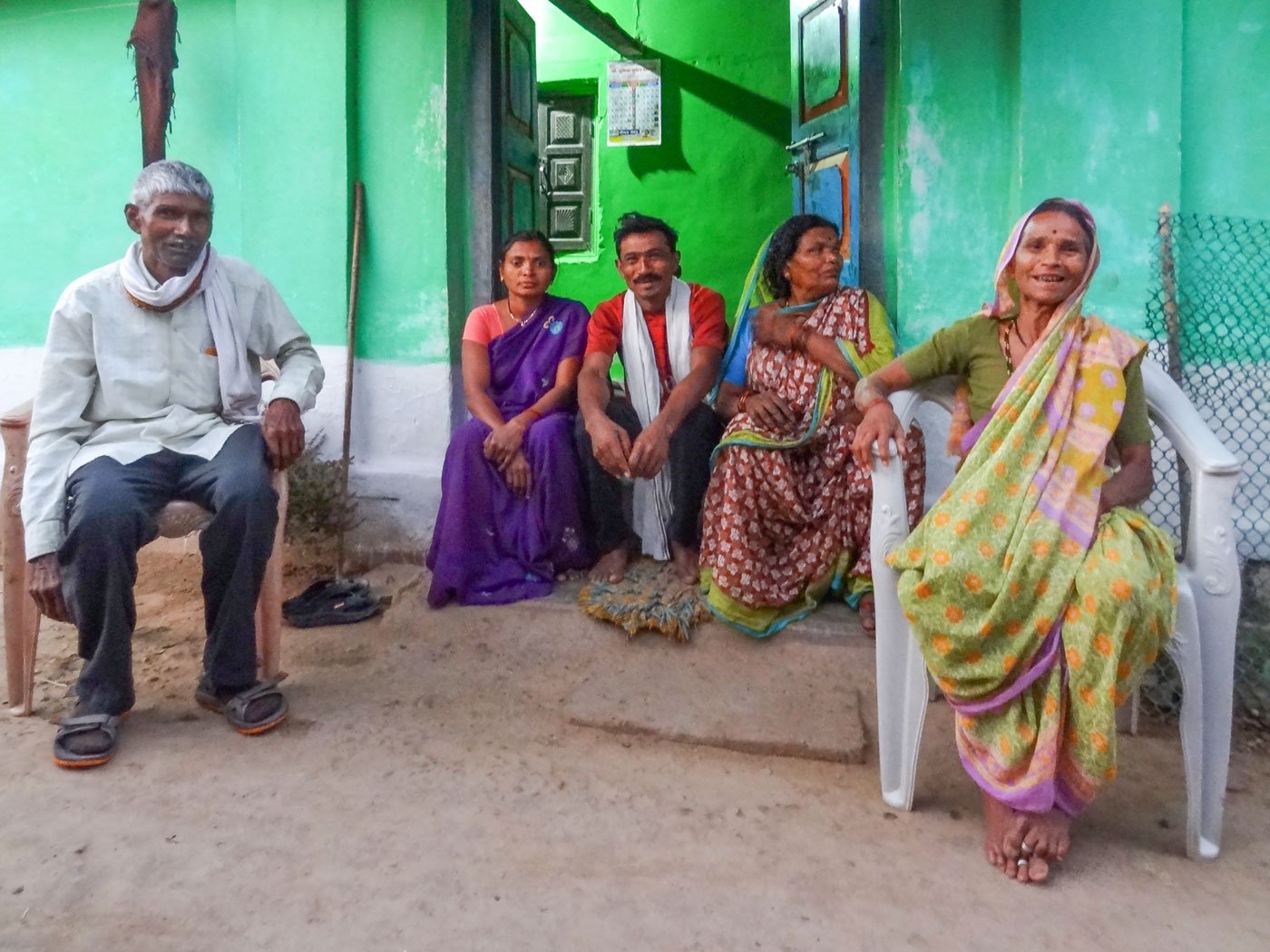
Left to right: Dadaji, Jayashree, Ramchandra, his aunt Shashikala and mother Anjanabai outside their home in Kholdoda village
An adventure for city people, but for my hosts, it is a routine carried out almost through the year. They have Rabi crops – chilly, toor , wheat, and black gram – nearing harvest that must be protected.
Dadaji’s farm is on the other side, but we will go spend the night on Ramchandra’s land; have our dinner on the farm, perhaps around a bonfire. The winter chill is on the wane, and it’s likely to be around 14 degrees Celsius tonight. Ramchandra says December 2022 and January 2023 were exceptionally cold, with temperatures dropping to 6-7 degrees Celsius at night.
To keep vigil, at least one family member has to be on the farm at night. Working round the clock like this, and braving the cold at night, led to many villagers falling ill. Sleep deprivation, stress and cold bring on fevers and headaches, Ramachandra says as he lists their problems.
As we are about to depart, Dadaji calls his wife to hand over his cervical belt. “Doctor has asked me to wear it all the time,” he explains.
Why, I ask, does he need a cervical belt for neck support?
“We have all night to talk about it; hold on to your questions.”
But Ramchandra lets it out with a chuckle: “Old man fell down from the 8-feet tall machan [perch] on his farm a few months ago. He is lucky, or he would not be with us today.”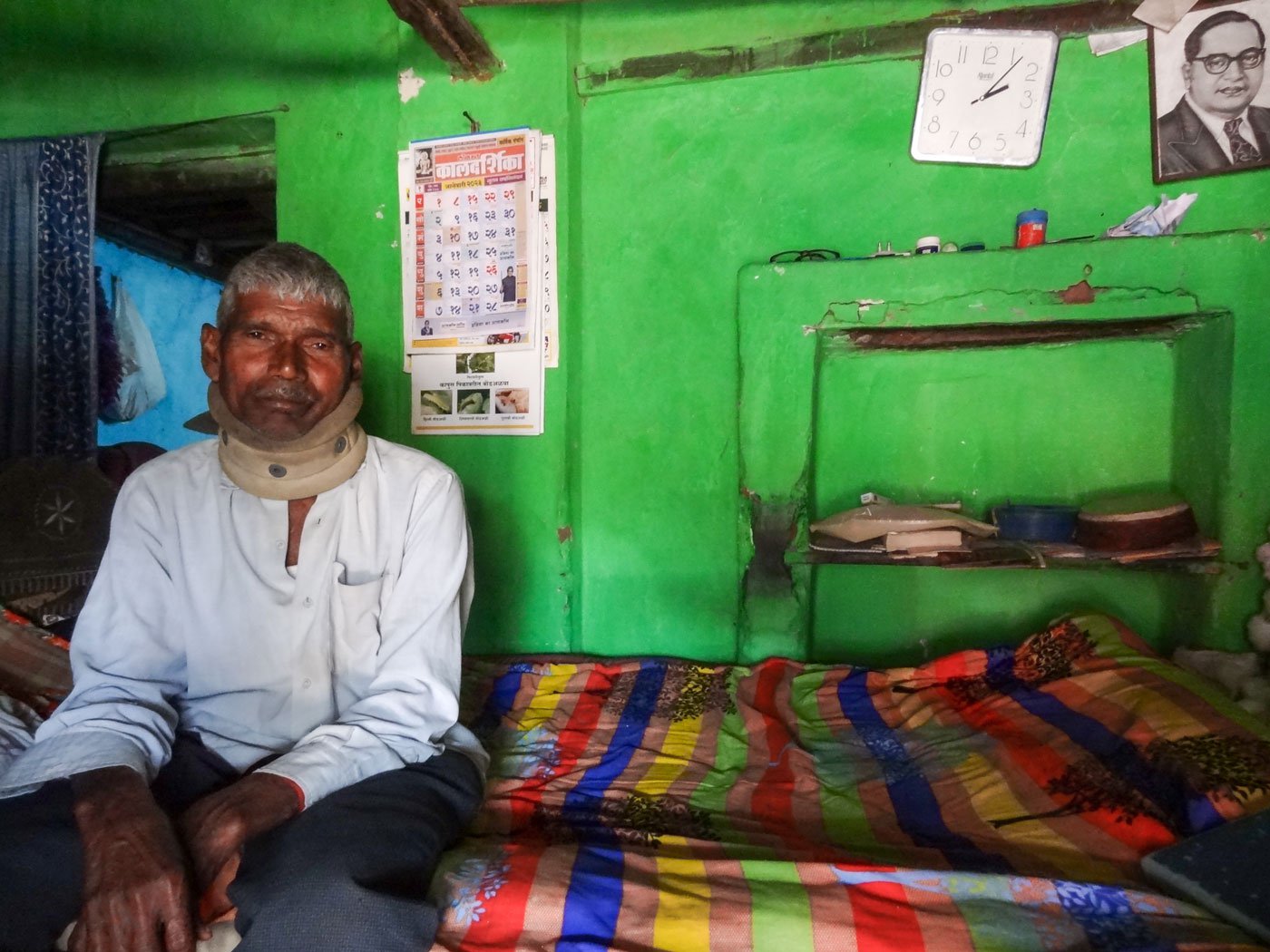
Dadaji Dodake, 70, wears a cervical support after he fell from the perch of his farm while keeping a night vigil
*****
Kholdoda, is part of the Alesur gram panchayat in Bhiwapur tehsil, about 120 kilometres from Nagpur. Bordering it are the forests of Chimur tehsil of Chandrapur district – the north-western fringes of the Tadoba Andhari Tiger Reserve (TATR).
Like hundreds of villages in the forest belt of Vidarbha, Maharashtra’s eastern region, Kholdoda is troubled by wild animals – villagers frequently lose their crops and cattle. Most farms are fenced, but night vigil is a way of life.
Through the day, people do routine farm work, tending to crops. But at night, mainly during the harvest, every household shifts to its farm to guard their standing crops from wild animals. This happens from August through March when farming is active, and at other times too.
Earlier in the day, when I arrived in Kholdoda, it was eerily quiet, not a soul on any farm, each one encircled by yards of nylon sarees. It’s 4 p.m. and even the village alleys wear an empty, deserted look, save for a few dogs here and there.
“From 2 p.m. to 4:30 p.m., everyone sleeps because we aren’t sure if we will be able to sleep at night,” Dadaji says when I arrive at his house and enquire why the village is silent.
“They [farmers] keep doing the rounds of the farms all day. It is like a 24-hour duty,” he quips.
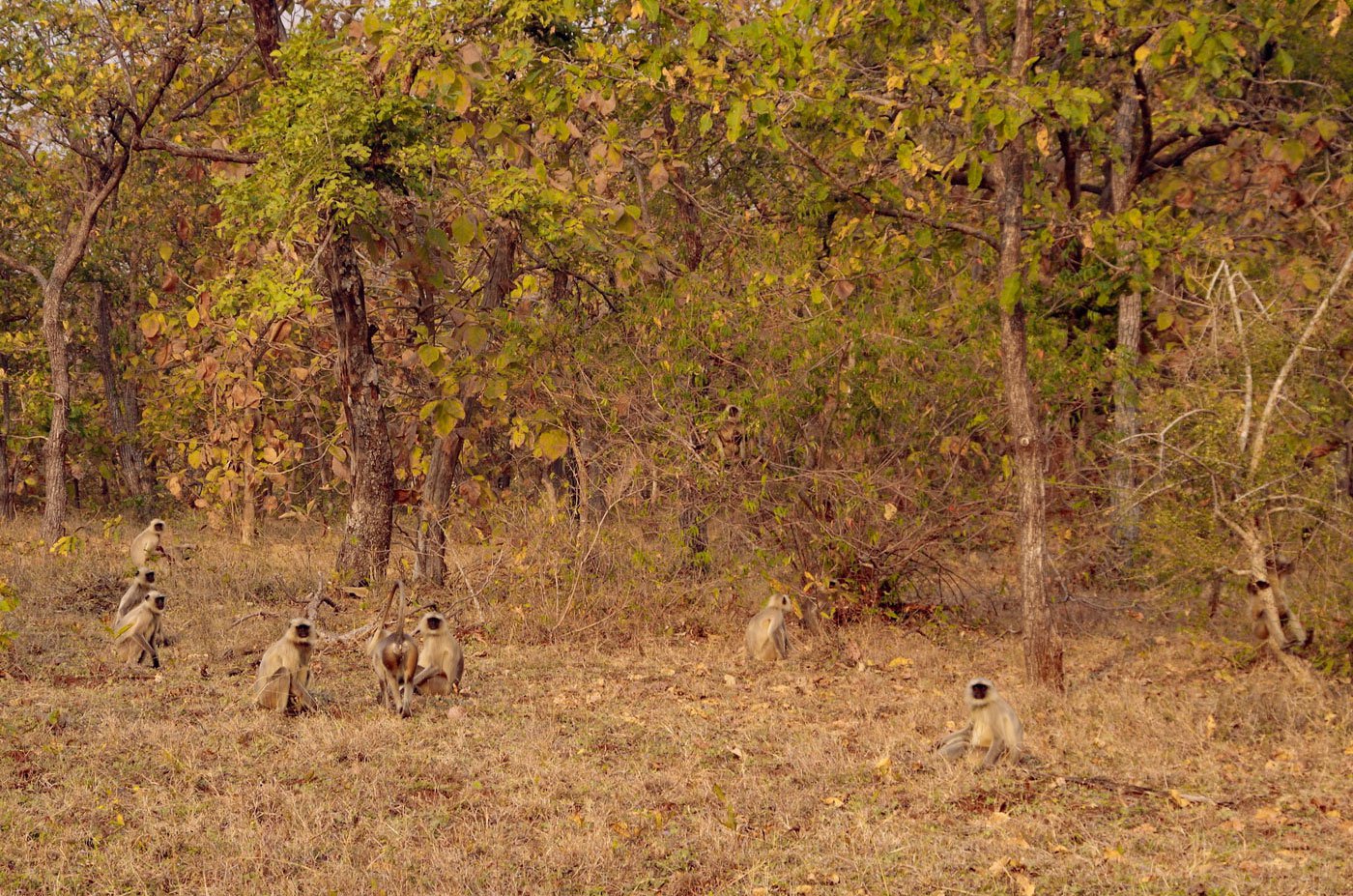
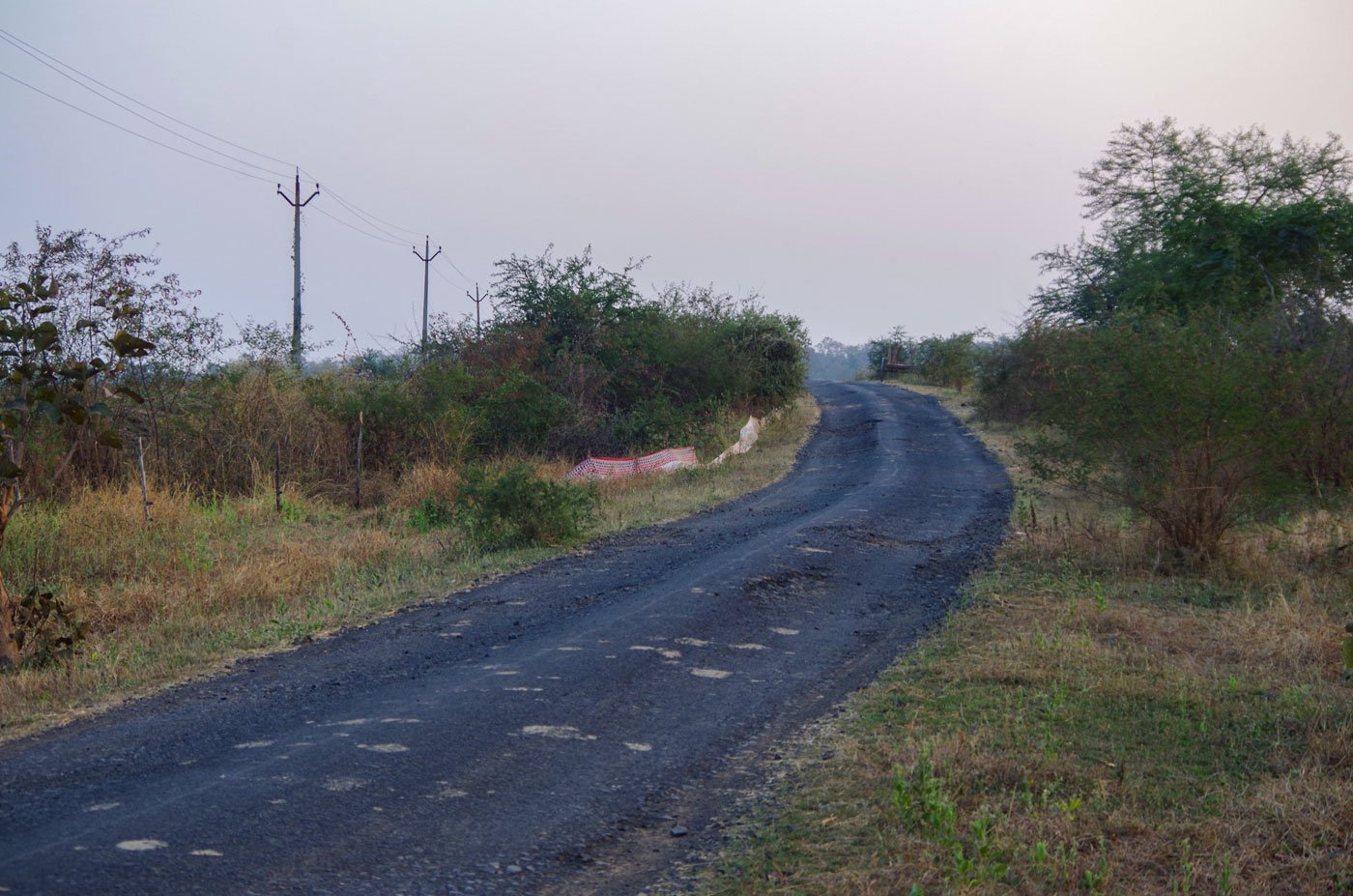
Monkeys frequent the forest patch that connects Kholdoda village, which is a part of Alesur gram panchayat
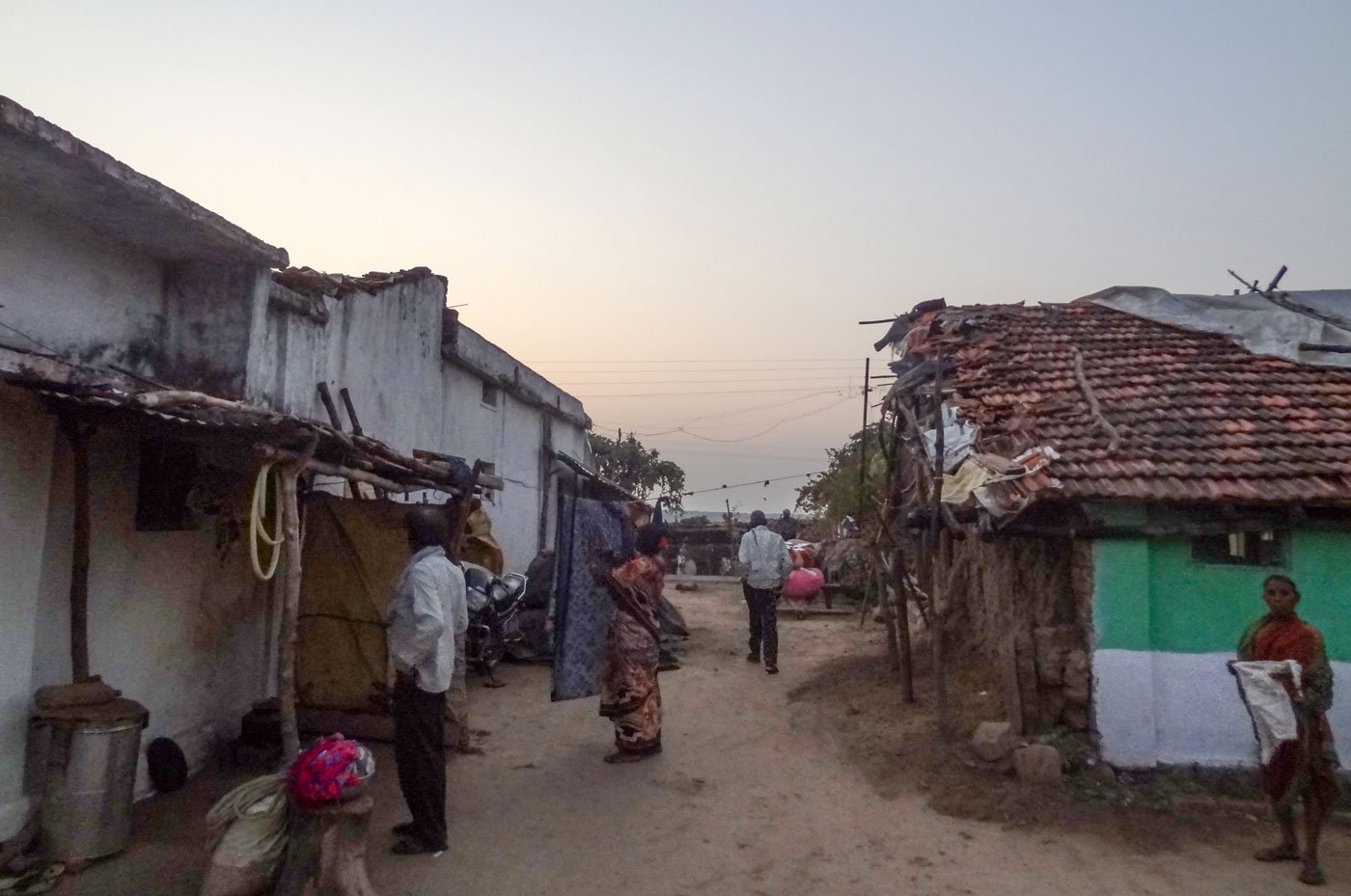
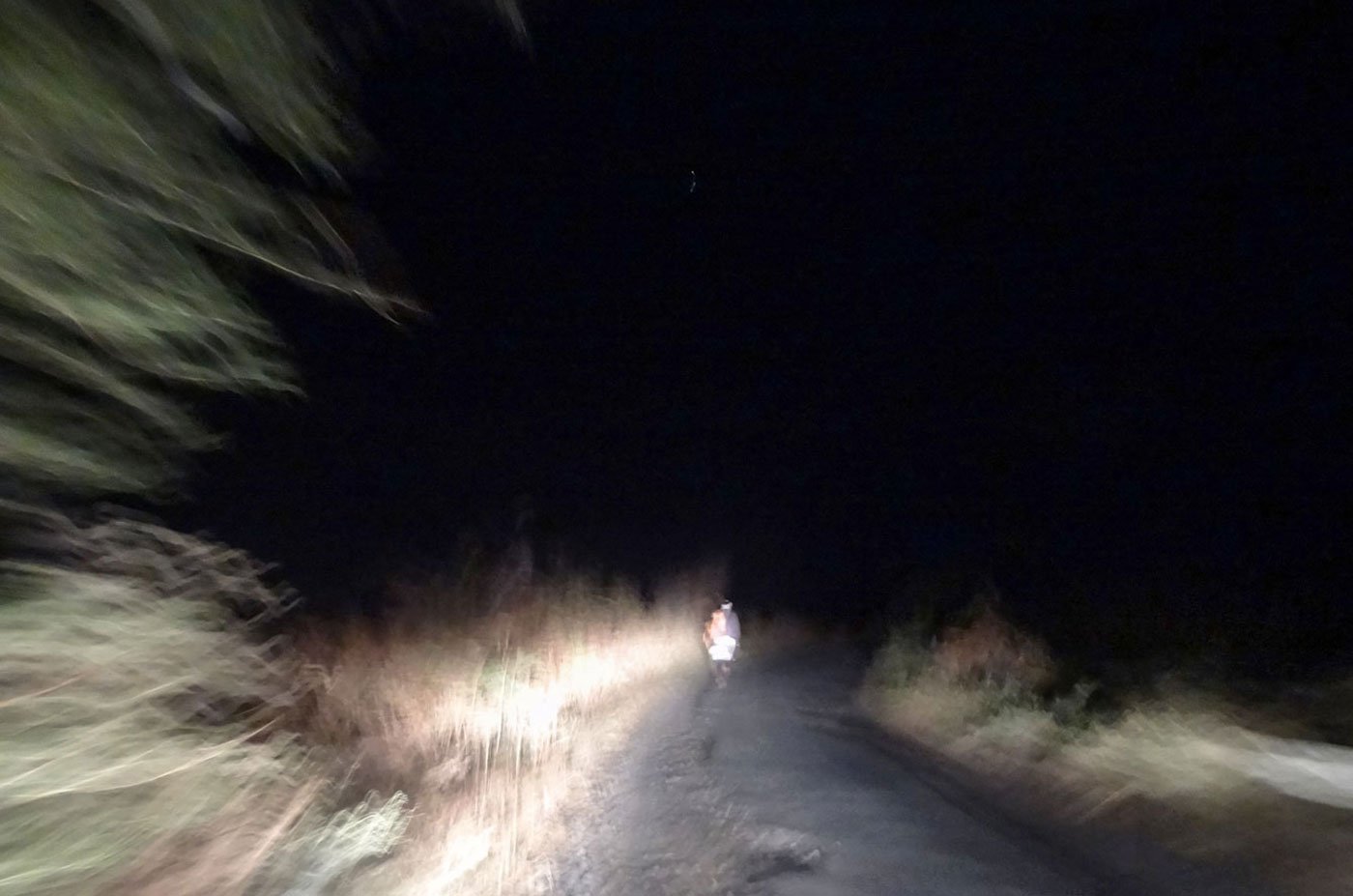
Left: Villagers in
Kholdoda
get ready for a vigil at the fall of dusk. Right:
A farmer walks to his farm as night falls, ready to stay on guard
As dusk falls, the village comes to life again – women begin cooking, men prepare for the night vigil, and cows wander home from the jungle with their herders.
Surrounded by thick forests, a mix of teak and other trees, Kholdoda is part of the Tadoba landscape, a village of about 108 households (Census 2011). Most are small and marginal peasants belonging to two main social categories: Mana Adivasis and Mahar Dalits, and a few households of other castes.
The farm holdings here are about 110 hectares, and the fertile, rich soil mostly depends on the rain. The crops are paddy, pulses, and a few grow wheat, millets and vegetables. Farmers here work on their own farms, but also subsist on minor forest produce and wage labour. Some young men have left for other towns to earn a livelihood as farming can no longer support them. Dadaji’s son is a police constable stationed in Nagpur. Some village people go to Bhiwapur to find labour work.
*****
While our dinner gets ready, we take a quick round of the village to witness the mood.
We meet three women – Shakuntala Gopichand Nannaware, Shobha Indrapal Pendam, and Parbata Tulshiram Pendam, all in their 50s; they are scurrying to their farm a bit early. There’s a dog to keep them company. “We are scared, but what do we do?” Shakuntala says when I ask how difficult it is to do household chores, farm labour, and also keep a night vigil. At night, they will take rounds of their farms while supporting each other by being close by.
We see Gunwanta Gaikwad chatting with his friends on the village's main road opposite Dadaji’s home. “You’ll see a tiger if you are lucky today,” one of them quips. “We see tigers crisscrossing our farms regularly,” says Gaikwad.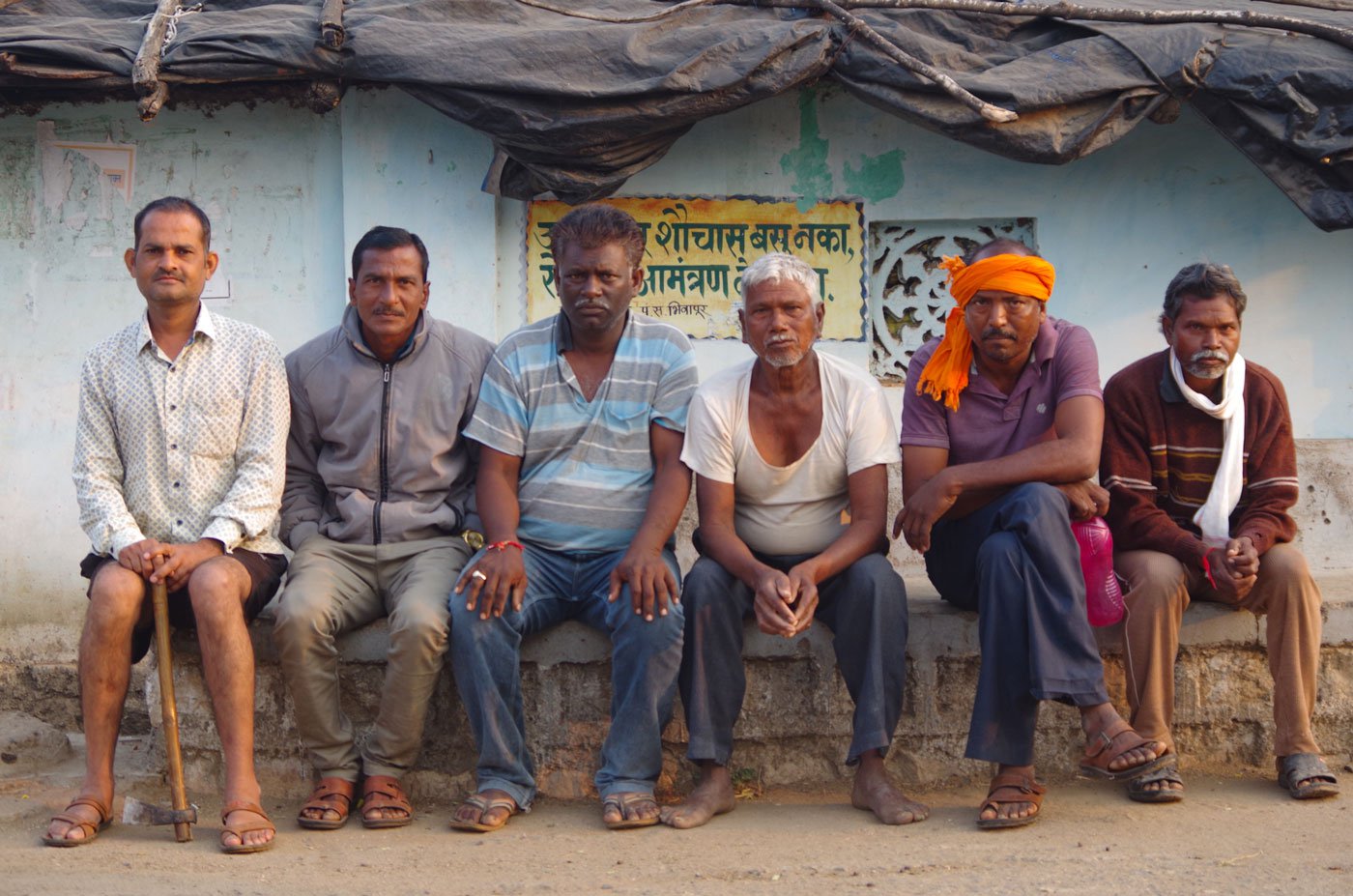
Gunwanta Gaikwad (second from right) and other villagers from Kholdoda prepare to leave for their farms for a night vigil
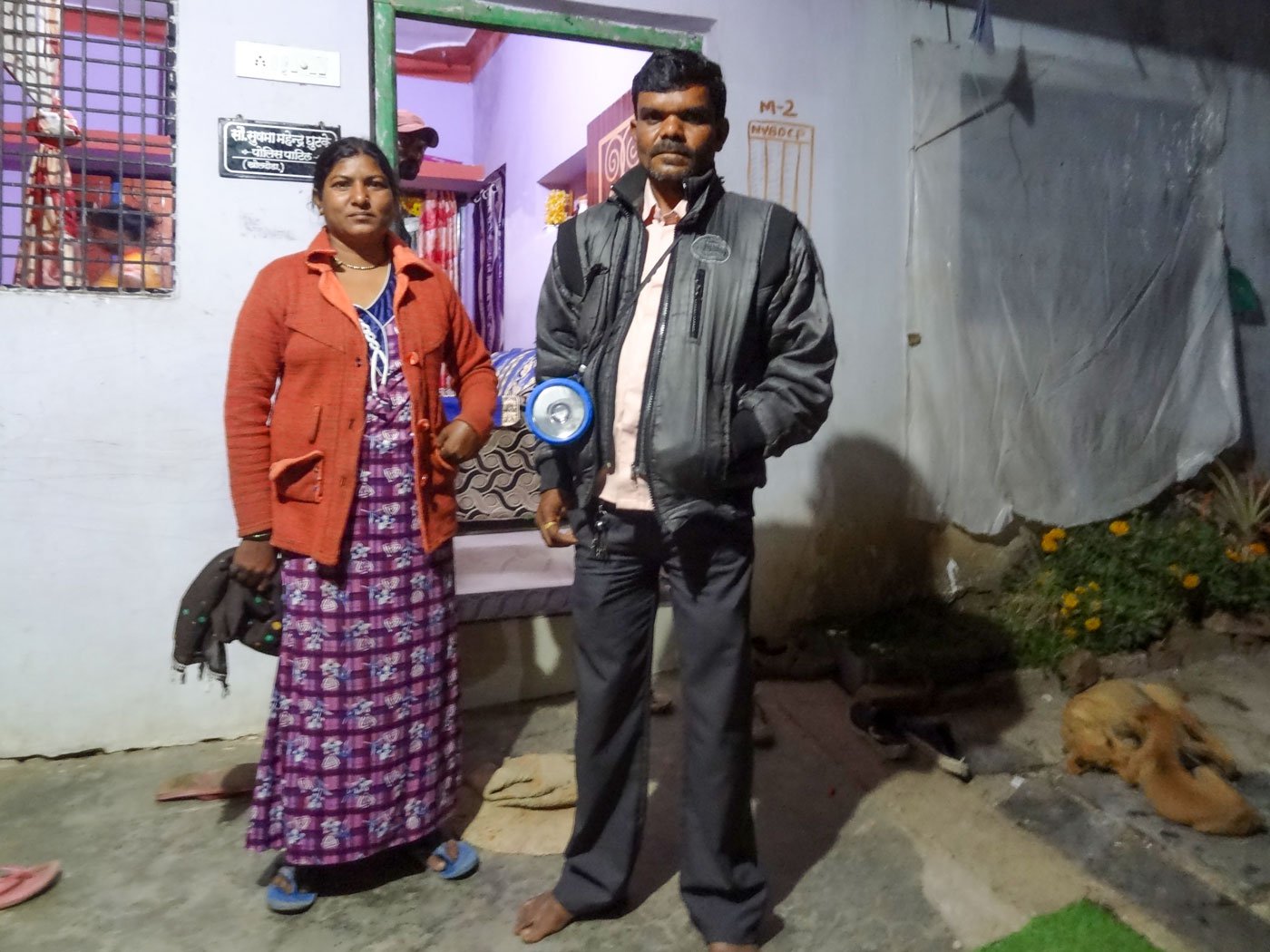
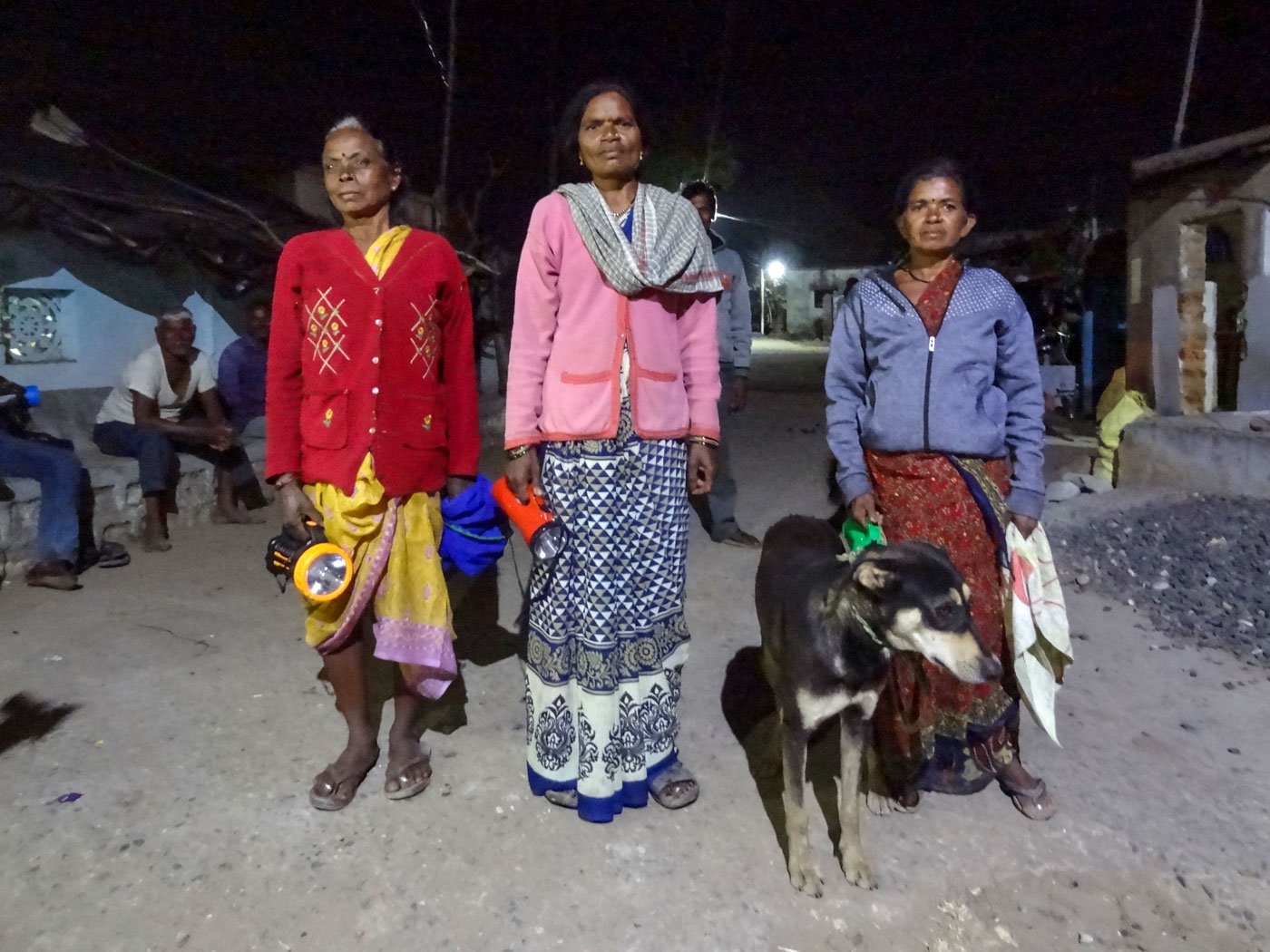
Left:
Sushma Ghutke, the woman ‘police patil’ of Kholdoda, with Mahendra, her husband. Right:
Shakuntala Gopichand Nannaware, Shobha Indrapal Pendam, and Parbata Tulshiram Pendam, all in their 50s, heading for their farms for night vigil (right to left)
We meet Rajhans Bankar, the deputy sarpanch of the village, at his home; he is finishing his dinner, after which he will leave for the farm; he is exhausted and tired from the day’s work – Bankar tends to the panchayat’s administrative duties.
Next, we meet Sushma Ghutke, the incumbent woman ‘police patil’, riding pillion with her husband Mahendra, on their way to their farm. They have packed dinner, a couple of blankets, a wooden rod, and the long-distance torch. We see others walking to their farmlands, lugging torches, wooden sticks, and blankets.
“ Chala amchya barobar ,” Sushma says with a smile inviting us to join them on their farm. “You’ll hear a lot of noise at night,” she says. “Stay awake until at least 2:30 a.m. to feel the buzz.”
Wild boars, nilgais, deer, sambars, peacocks, rabbits – they all come visiting at night for food. Sometimes, she says, they spot tigers and leopards too. “Ours are animal farms,” she quips.
A few houses away, Atmaraam Savsakhale, 55, a local political leader with 23 acres of ancestral farmland, is preparing for the night vigil. His farm hands should already be on the farm by now, he says. “Since my farm is large, it’s difficult to guard it,” he says. There are at least six or seven perches on his farm, to keep an eye on every major patch of crop, now of wheat and chickpea ( chana ).
By 8:30 p.m., Kholdoda’s families have shifted to their second home for the night – the farm.*****
Ramchandra has built several machans all over his farm from where you can hear but not see each other. And you can catch a safe nap here. Machans are raised platforms made of wood, seven or eight feet tall, with canopies of dry hay or a tarpaulin sheet. Some of these perches accommodate two persons, but most can take only one.
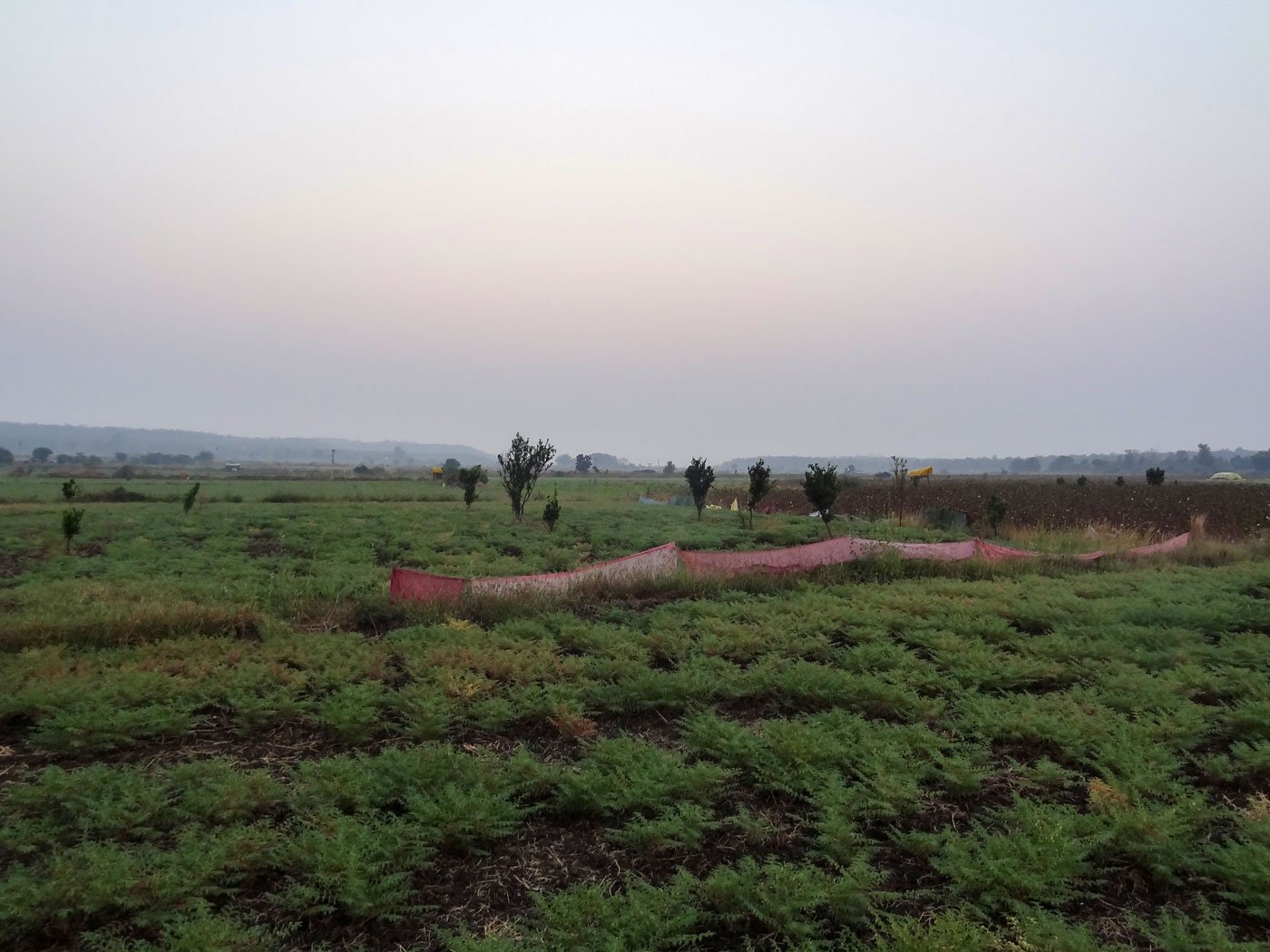
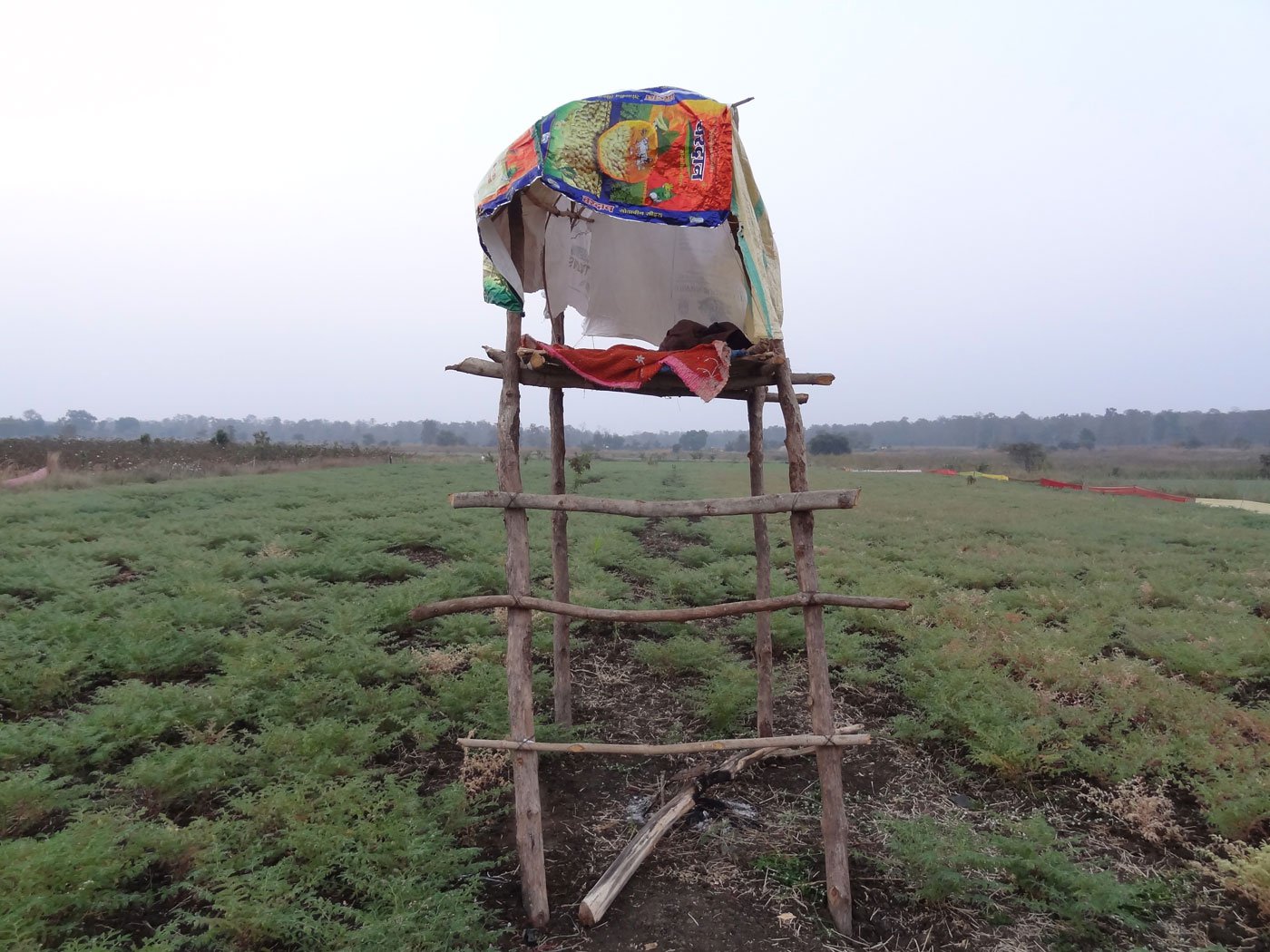
Ramchandra has built several machans (right) all over his farm. Machans are raised platforms made of wood with canopies of dry hay or a tarpaulin sheet
In fact, in this part of Bhiwapur, which is contiguous to the forests, you can spot an astonishing variety of perches – showcasing the architectural handiwork of the farmers who spend nights there.
“You can take any one of the perches,” he tells me. I choose the one with a tarpaulin sheet right in the middle of the farm that currently has chana and is nearing harvest. I suspect that the one with a hay canopy harbours rodents. The machan sways as I climb. It’s 9: 30 p.m. and we are to have dinner. We settle down around a bonfire in the cement barn; the temperature is dropping. It’s pitch dark out here, but the skies are clear.
Dadaji starts talking over dinner:
“Four months ago, my perch suddenly caved in, in the middle of the night, and I fell on my head from a height of seven feet, and badly hurt my neck and back.”
It happened around 2:30 a.m. Thankfully the surface he landed on was not hard. He says he lay there for at least a couple of hours, in shock and writhing in pain. One of the wooden logs on which the perch was raised had caved in as the soil in which it was rooted, had loosened.
“I could not move and there was nobody out there to help me.” One is all alone on the farm at night, even if there are people in the vicinity guarding their own farms. “I thought, I will die then,” he says.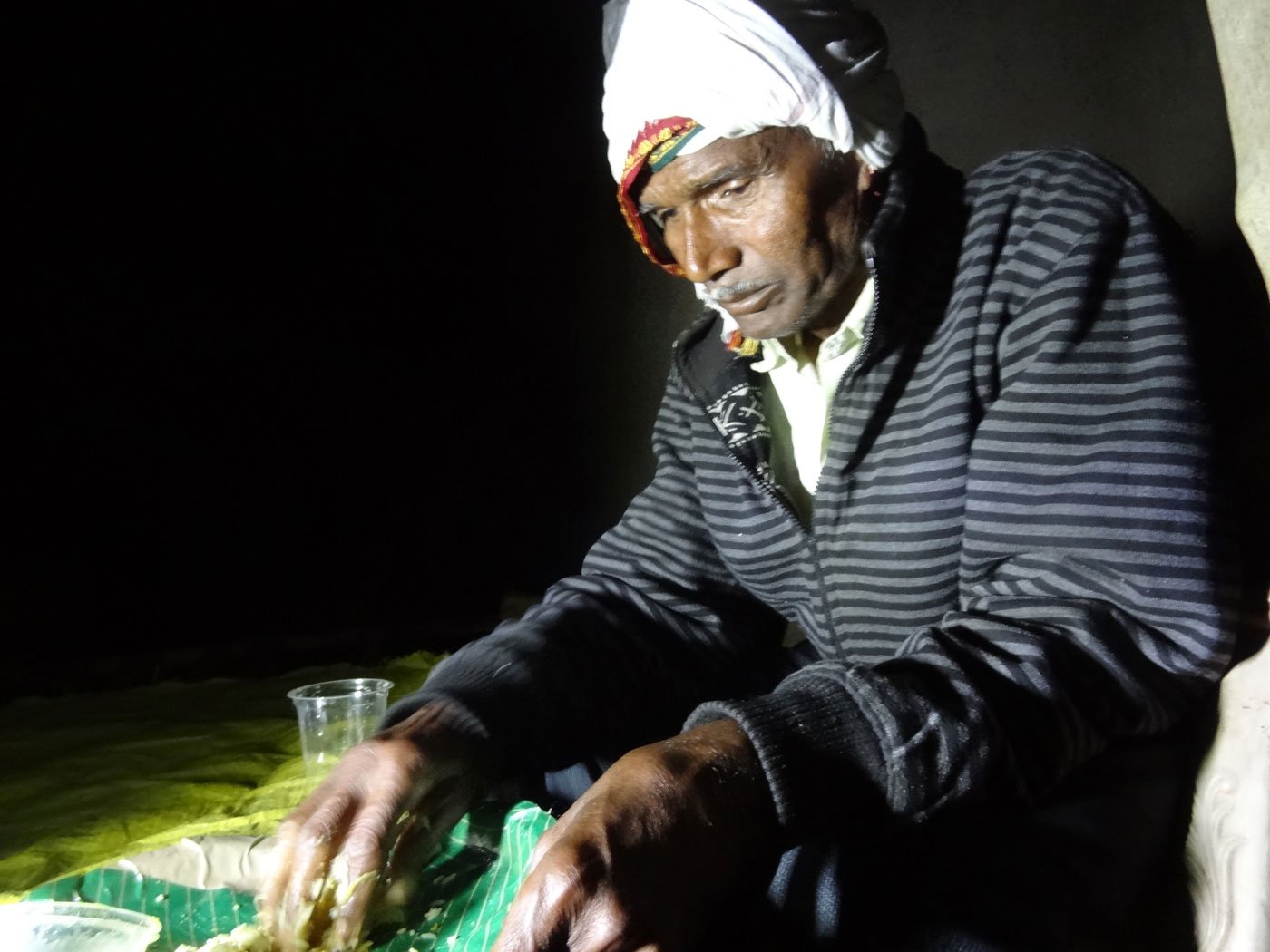
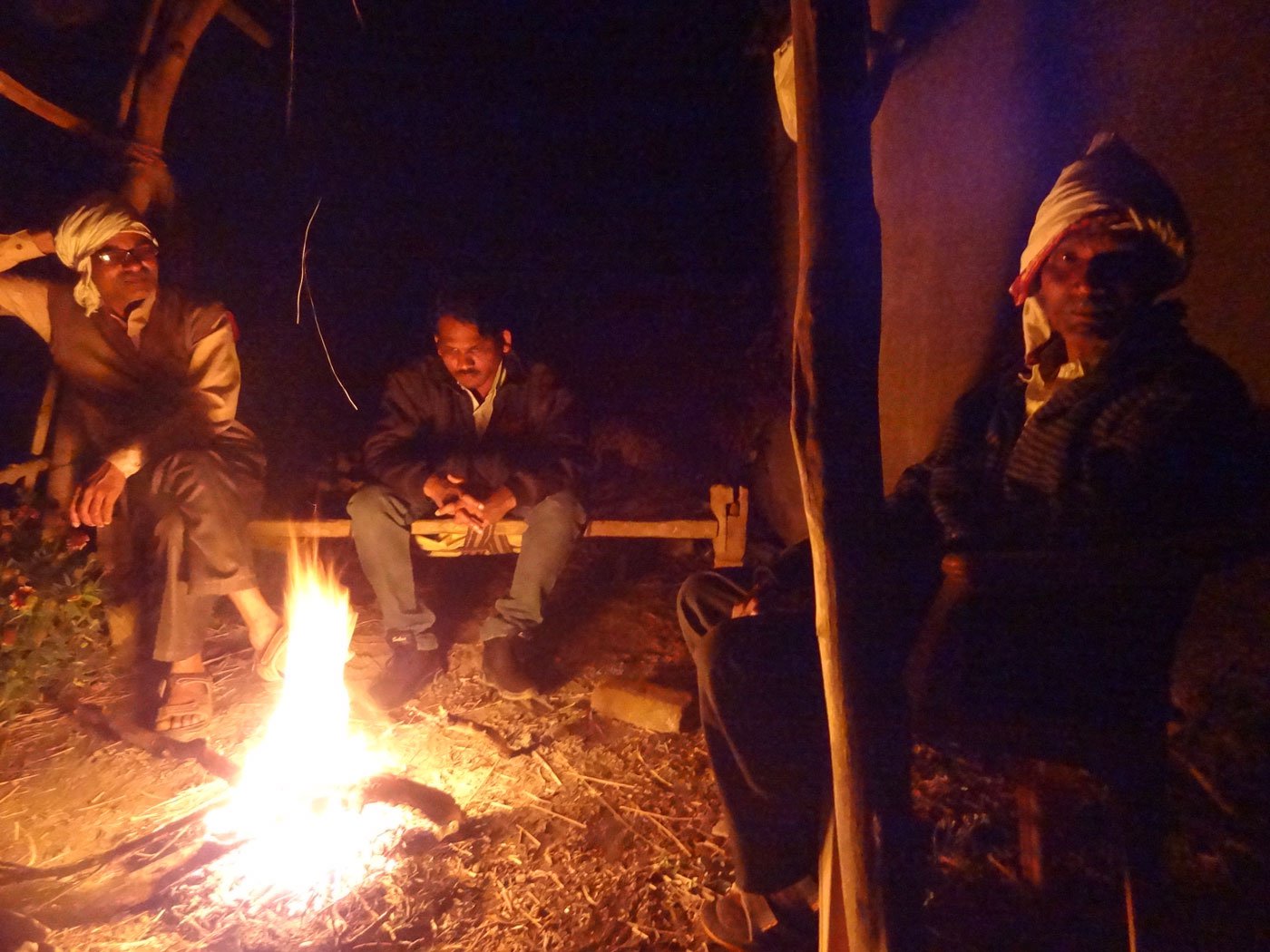
Dadaji (left) and Ramchandra lit a bonfire to keep warm on a cold winter night during a night vigil
In the wee hours, he finally managed to stand up, and despite the severe neck and back ache, he walked home, a distance of two-three kilometres. “Once home, all my family and neighbours came rushing to help.” Dadaji’s wife, Shakubai, was terrified.
Ramchandra took him to a doctor in the
tehsil
town of Bhiwapur, from where he was shifted in an ambulance to a private hospital in Nagpur. His son arranged for the hospitalisation.
The X-ray and MRI scans suggested concussion, but luckily no fracture. But after the fall, the tall and slim man gets dizzy if he sits or stands for long, so he lies down. And sings bhajans .
“That is the price I paid for keeping night vigil, and why? Because if I did not guard my crops, these wild animals will not allow me to reap anything from my farm,” he tells me.
Dadaji says there was no need for night vigils when he was young. The intensity of animal raids has increased in the last 20 years. Not only have the forests shrunk, but wild animals also don’t get ample food or water there, he says, and their numbers have also increased. And so thousands of farmers spend their nights on farms, keeping vigil, trying to protect their crops from night raiders, the wild animals waiting to devour the standing crops.
Accidents, falls, nasty confrontation with wild animals, sleep deprivation resulting in mental health problems, and general illnesses – this is the new normal for farmers in Kholdoda, and the larger region of Vidarbha, compounding the problems of a beleaguered peasantry.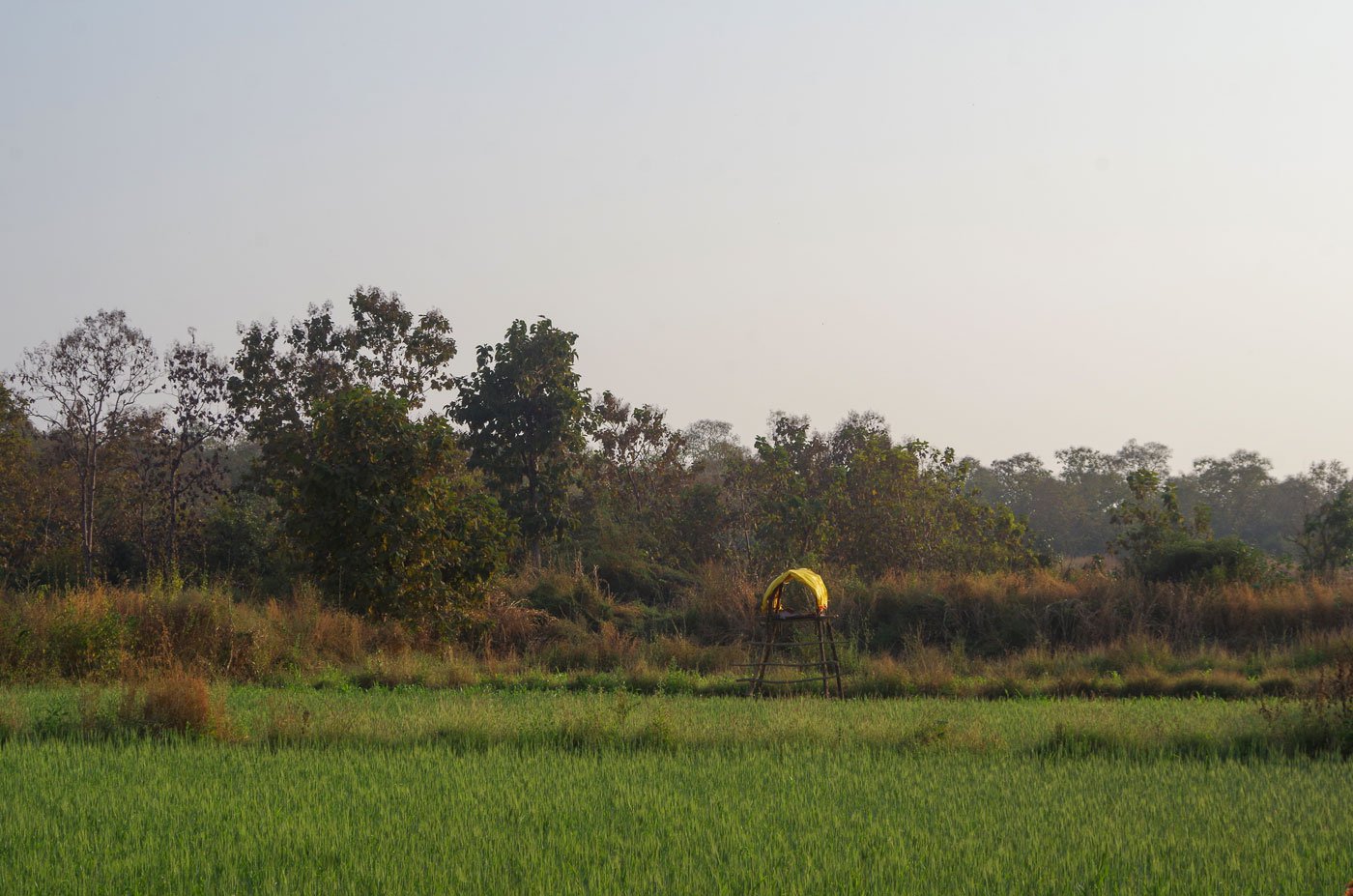
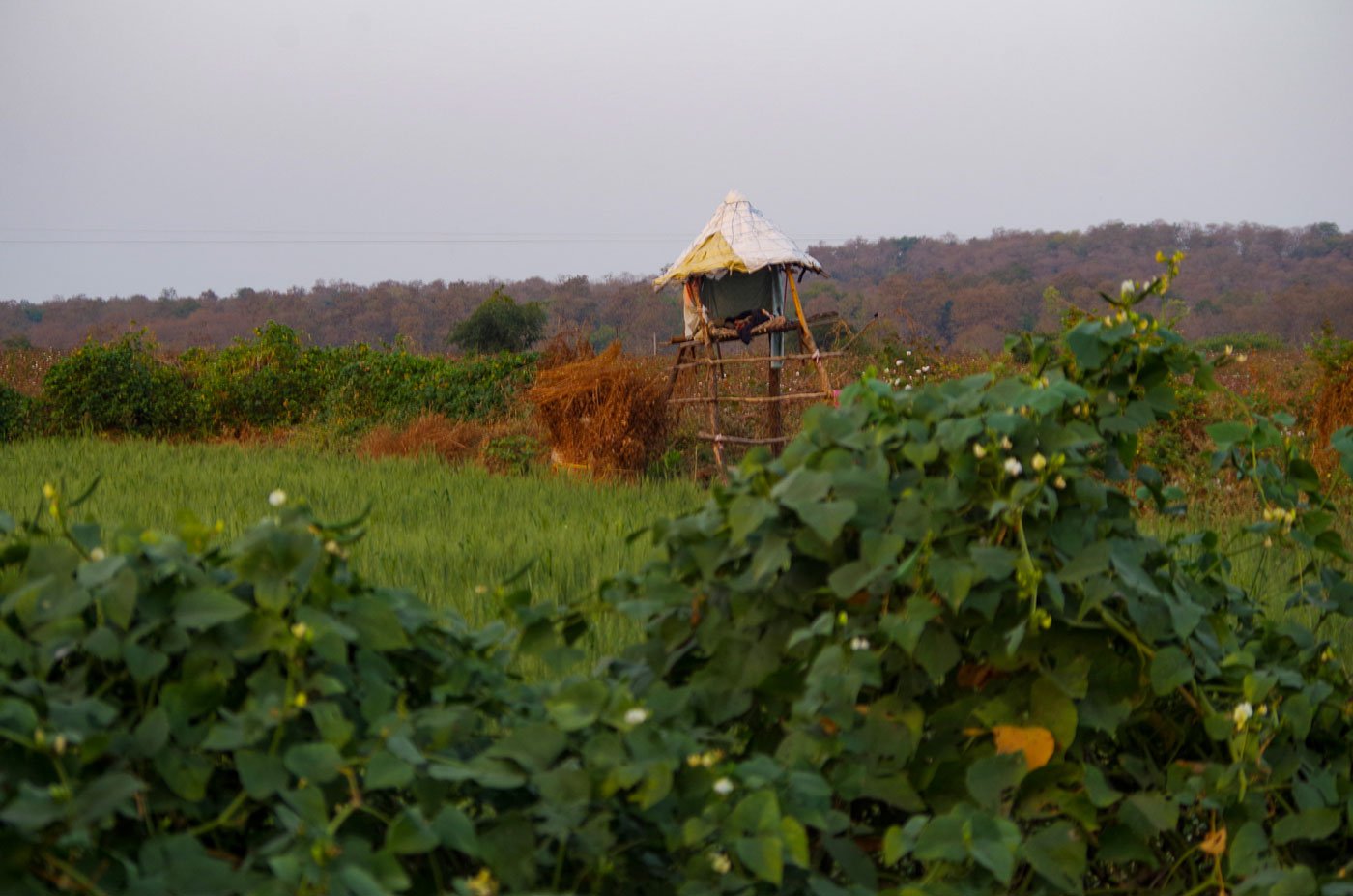
Machans , or perches, can be found across farms in and around Kholdoda village. Some of these perches accommodate two persons, but most can take only one
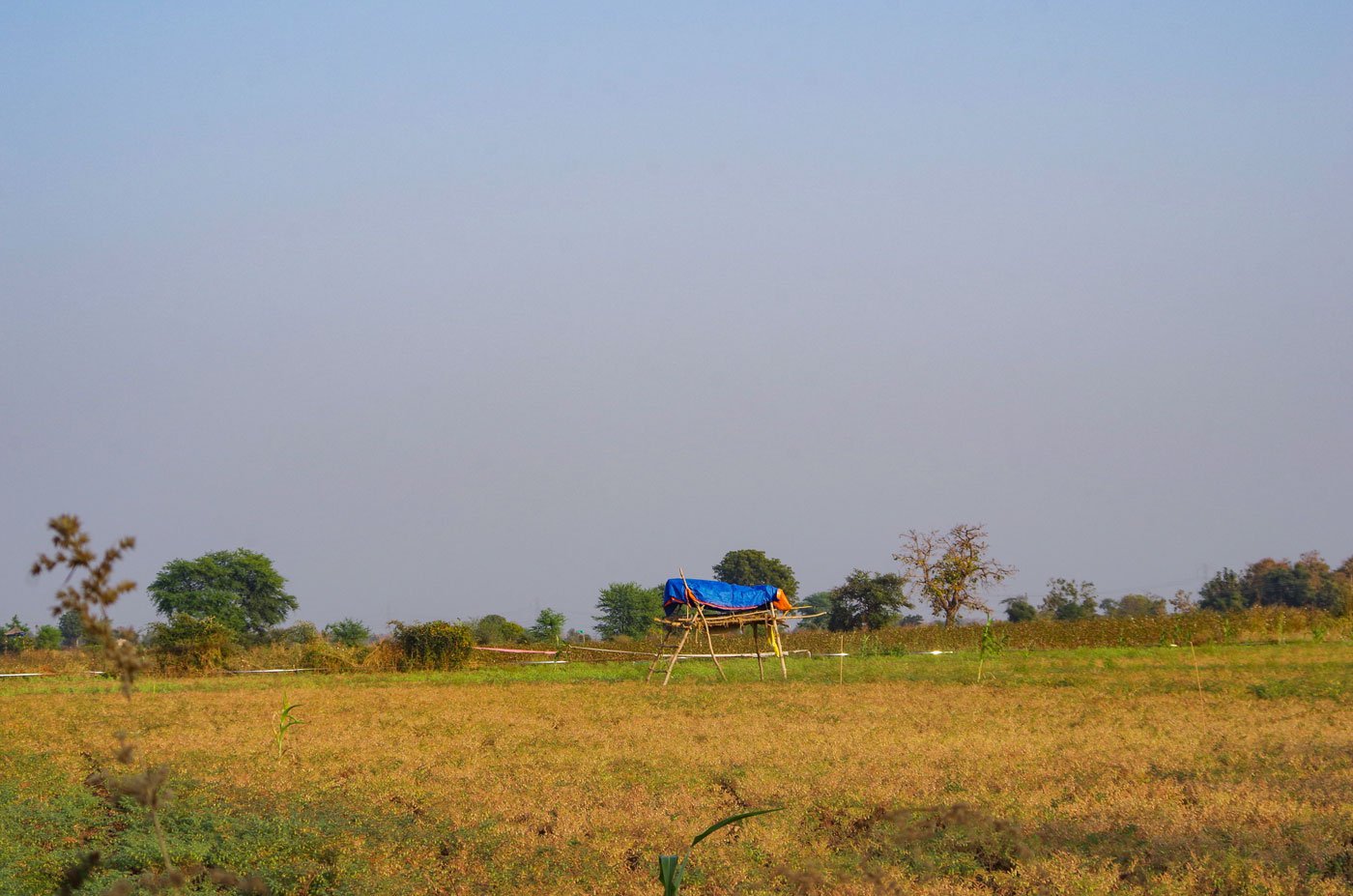
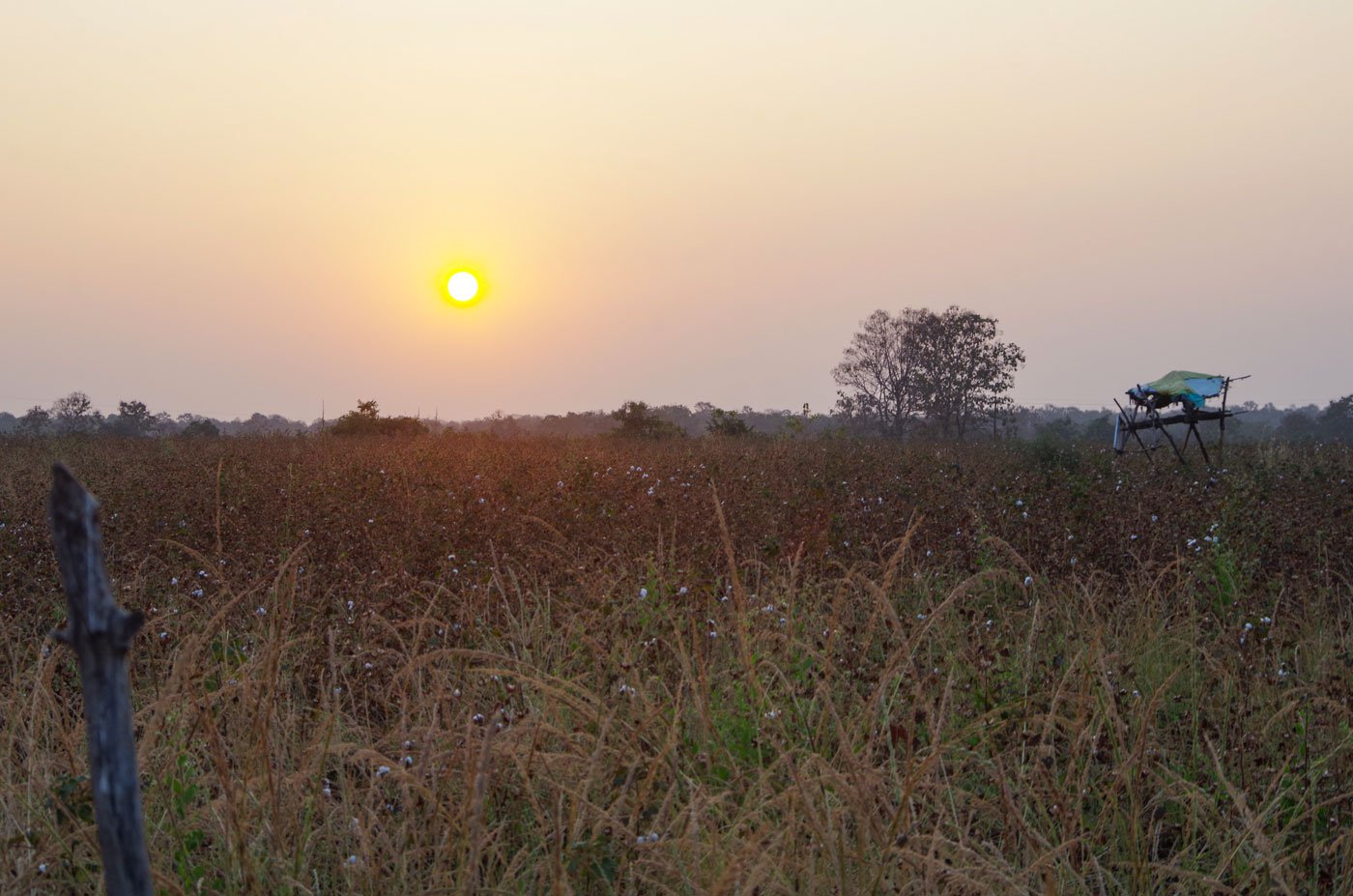
Farmers house themselves in these perches during the night vigil. They store their torches, wooden sticks, blankets and more inside
In the past couple of years, during my travels in the countryside, I met farmers who suffer from stress because of sleep apnea, a disorder when your breathing stops and restarts while you are asleep.
“It does a lot of harm to your body – we must work in the day and at night too without much sleep,” Ramchandra rues. “There are times when we can’t leave our farm even for a day.”
If you are eating rice or lentils or black gram from here, he says, it has likely survived the wild animals’ raids because someone somewhere managed to protect his or her crop, spending sleepless nights.
“We play the alarms, light the fire, fence our farms, but if you are not on the farm at night, chances are that you’ll lose everything that you’ve planted,” Ramchandra says.
*****
After dinner we walk in a single file behind Ramchandra, flashing our torches in the inky darkness to guide us through the maze of farms.
It’s 11 p.m. and we hear people shouting, “Oy…Oy…Eeee – at a distance from time to time, to frighten away the animals and announce their presence on the farms.
When he’s alone on other days, Ramchandra takes a round of the farm every hour, carrying a long, heavy wooden stick. He is especially vigilant between 2 a.m. and 4 a.m. when, he says, animals are most active. In between, he tries to take a nap but is alert.
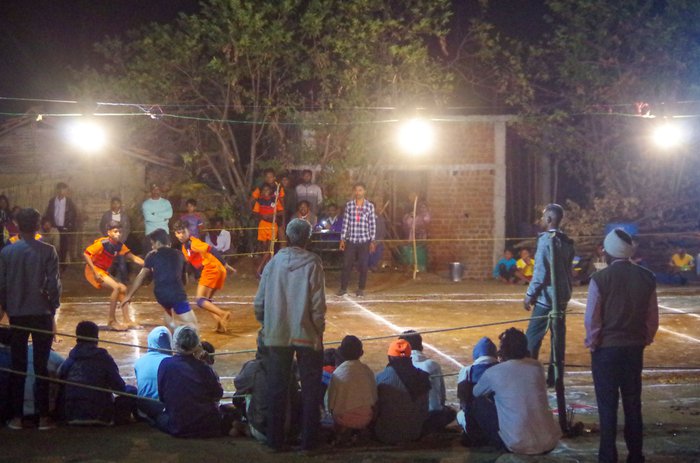
Villages play a game of kabaddi during a night-tournament
Farmers living around Tadoba Andhari Tiger Reserve build machans on their farms, where they spend their nights guarding it from wild boars, nilgais, deer, sambars, peacocks and rabbits
Along the way, we spot a herd of wild boars crossing the road, followed by two jackals. A little later, a herd of deer are sighted along the patches of forest. So far, there is no sign of the tiger.
In Alesur, a large crowd is engrossed in watching a close game of Kabaddi between two archrivals from nearby villages. The excitement is palpable. Over 20 teams are participating in the tournament and matches will go on until morning; the final is slated for 10 a.m. The villagers will shuttle through the night between their farms and the tournament venue.
They exchange information about the presence of a tiger around. “You be careful,” one of them tells Ramchandra. One of the Alesur villagers spotted it in the evening.
Tiger sightings are a mystery of sorts.
After a while we return to Ramchandra’s farm. It’s 2 a.m. and Ashutosh, the kid, has fallen asleep on a charpoy near the barn; Dadaji is sitting quietly watching over him and keeping the bonfire alive. We are tired, but not sleepy yet. We take another round of the farm.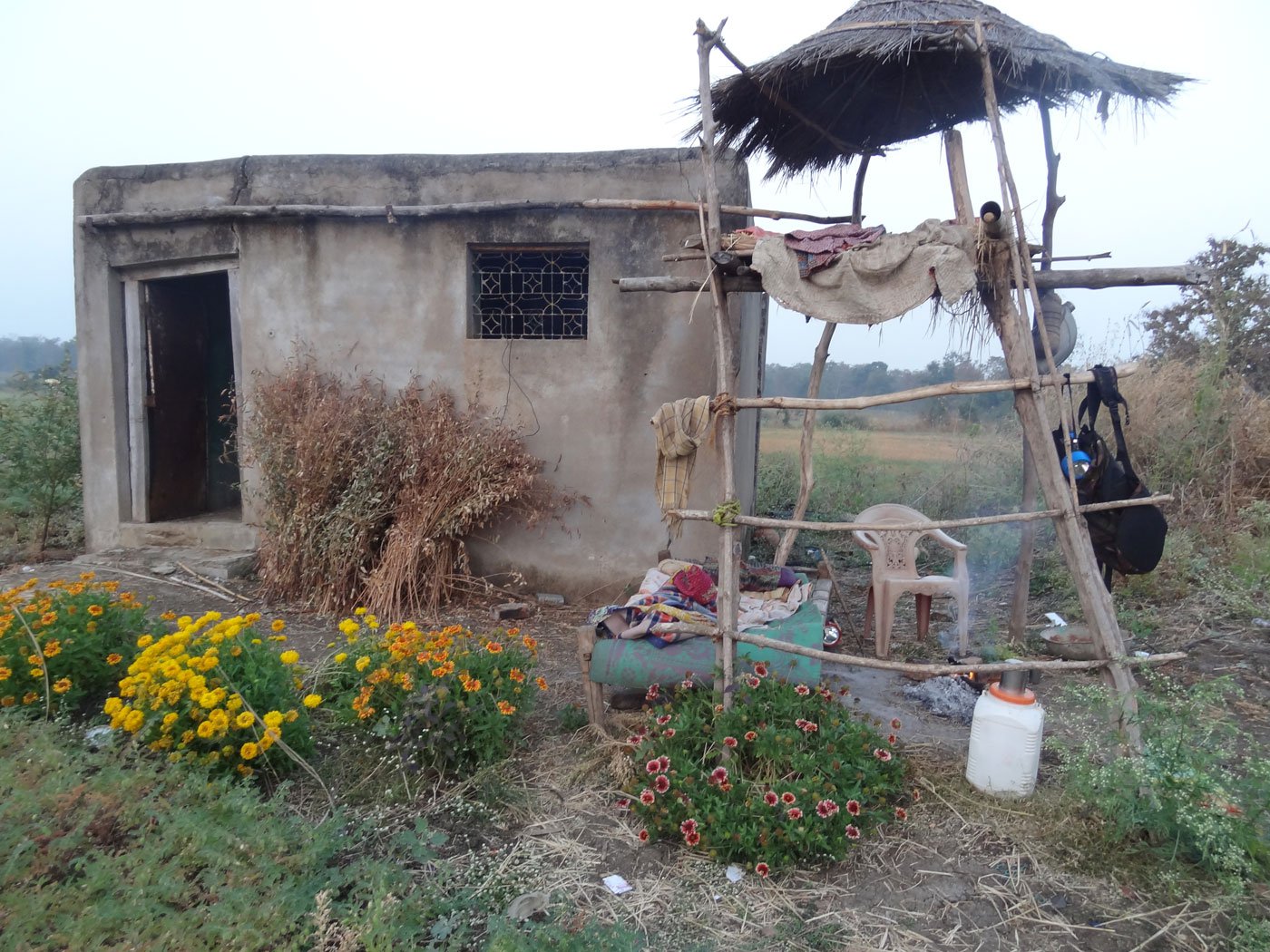
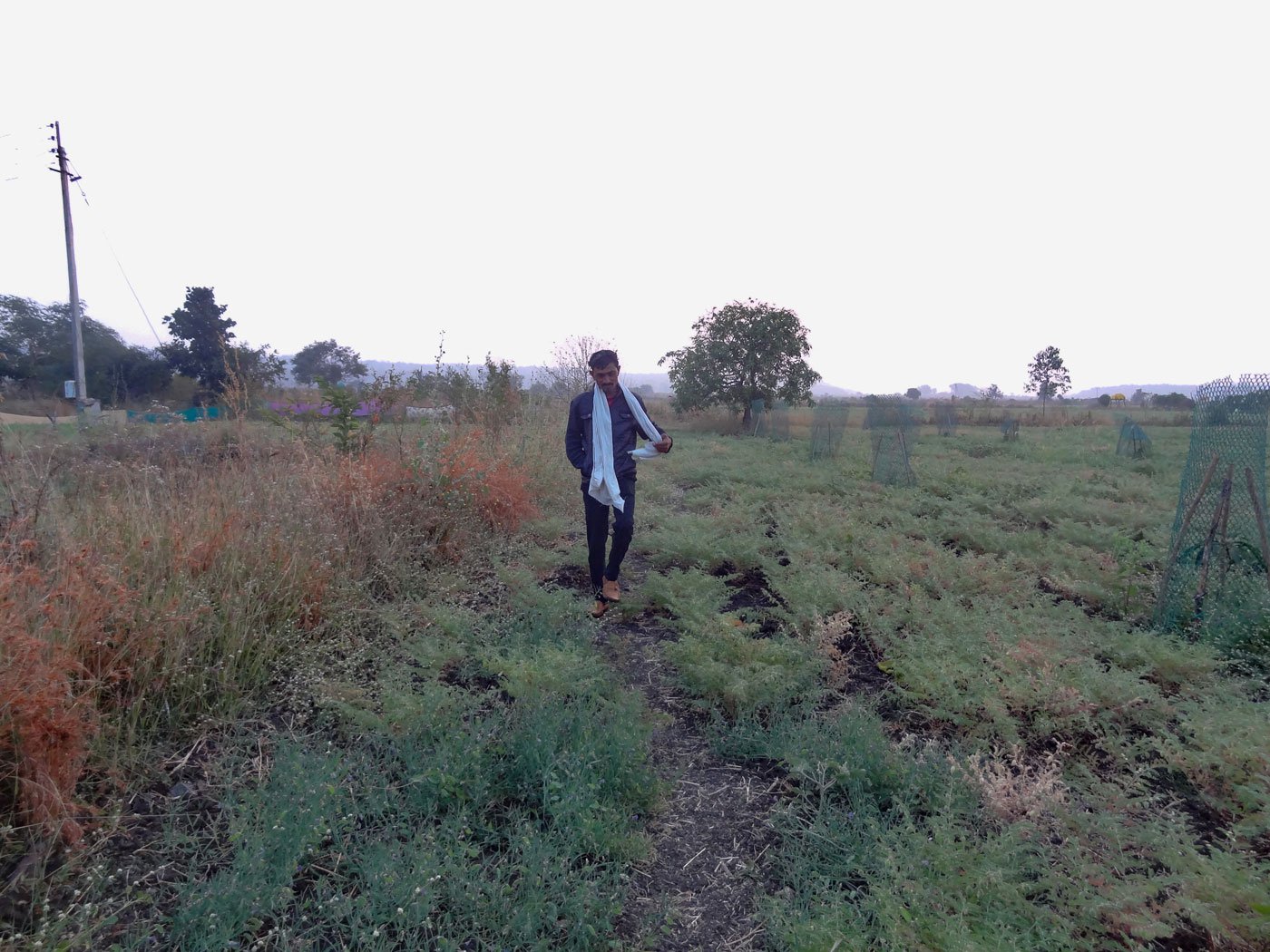
Ramchandra Dodake (right) at the break of the dawn, on his farm after the night vigil
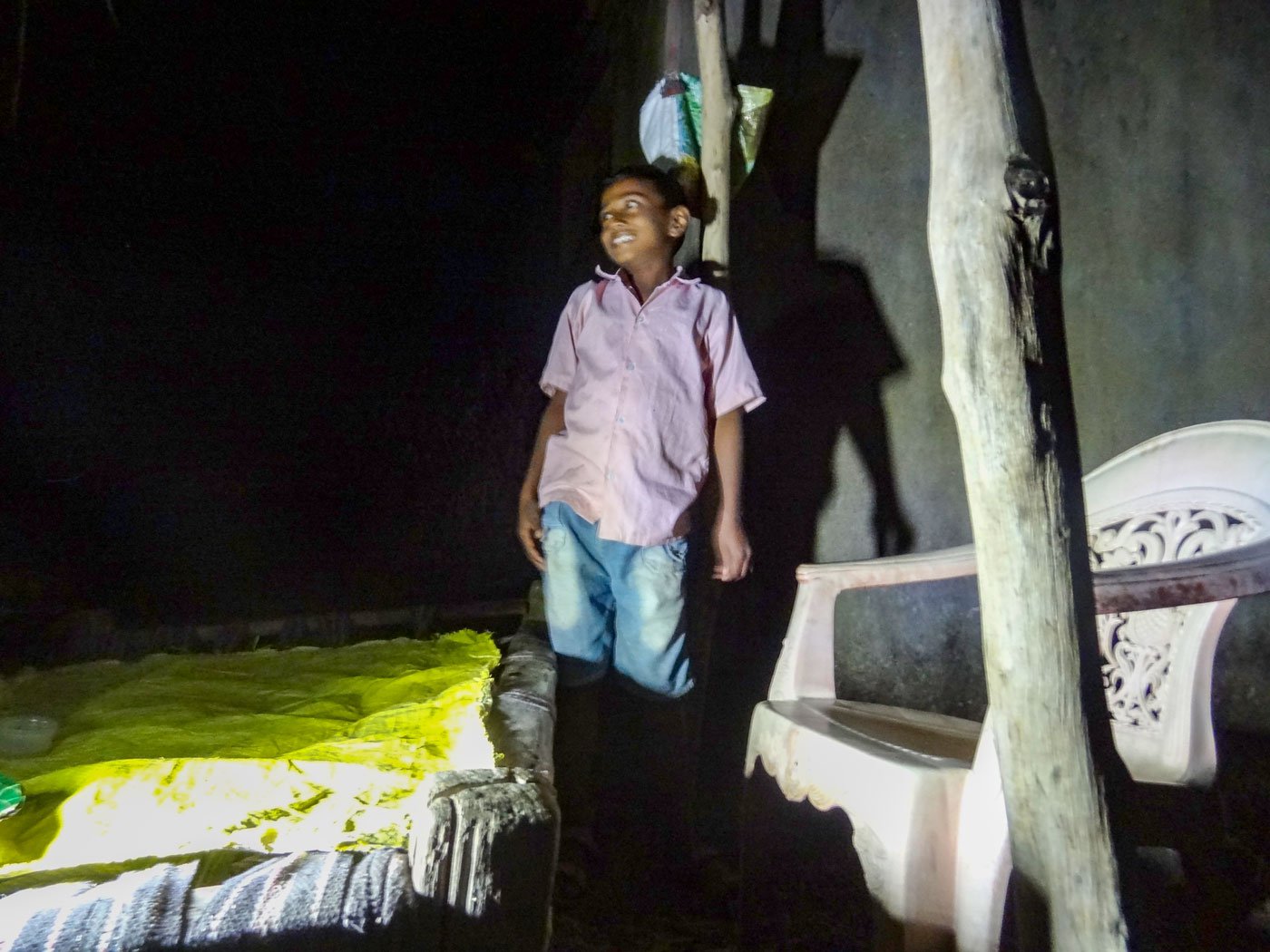
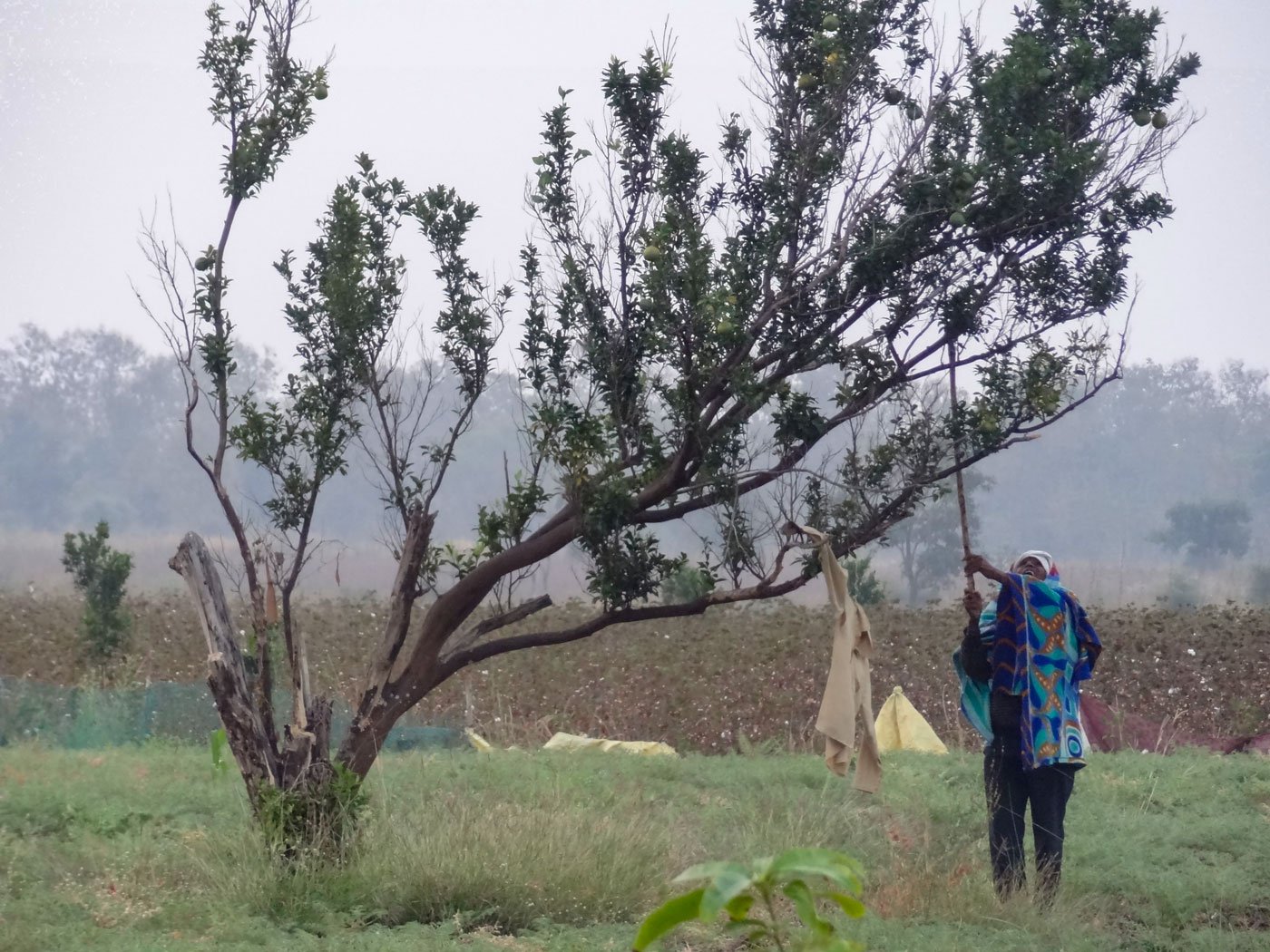
Left: Ramchandra Dodake's elder son Ashutosh, on the night vigil. Right: Dadaji plucking oranges from the lone tree on Ramchandra’s farm
Ramchandra dropped out of school after Class 10 and says that if there were other jobs, he would not be farming at all. He has shifted both his children to a boarding school in Nagpur because he does not want them to take to farming. Ashutosh is home for the holidays.
Suddenly, wild sounds burst out from all directions. These are farmers banging thalis (metal plates), shouting at the top of their voices. They will repeat this often to frighten away animals.
Seeing my startled expression, Dadaji is all smiles. So is Ramchandra. “This may sound weird to you,” he says, “But this is what happens all through the night. The farmers yell to signal the presence of some animals who may be crossing over to other farms.” After 15 minutes, the commotion ends and it’s all quiet again.
Around 3:30 a.m., under a star-lit sky, we disperse and retire to our swaying and swinging perches, the sound of insects around me gets louder. I lie flat on my back, the perch has just about enough space for me. The torn white tarpaulin sheet is fluttering with the breeze. I count the stars and fall asleep for a while. I hear intermittent sounds of people yelling until finally day breaks. From my vantage point on the perch, I scan the lush-green farms around me covered with a milky white dew.
Ramchandra and Dadaji have been up for a while. Dadaji plucks a few fruits from the lone mandarin tree on the farm and hands them to me to take home.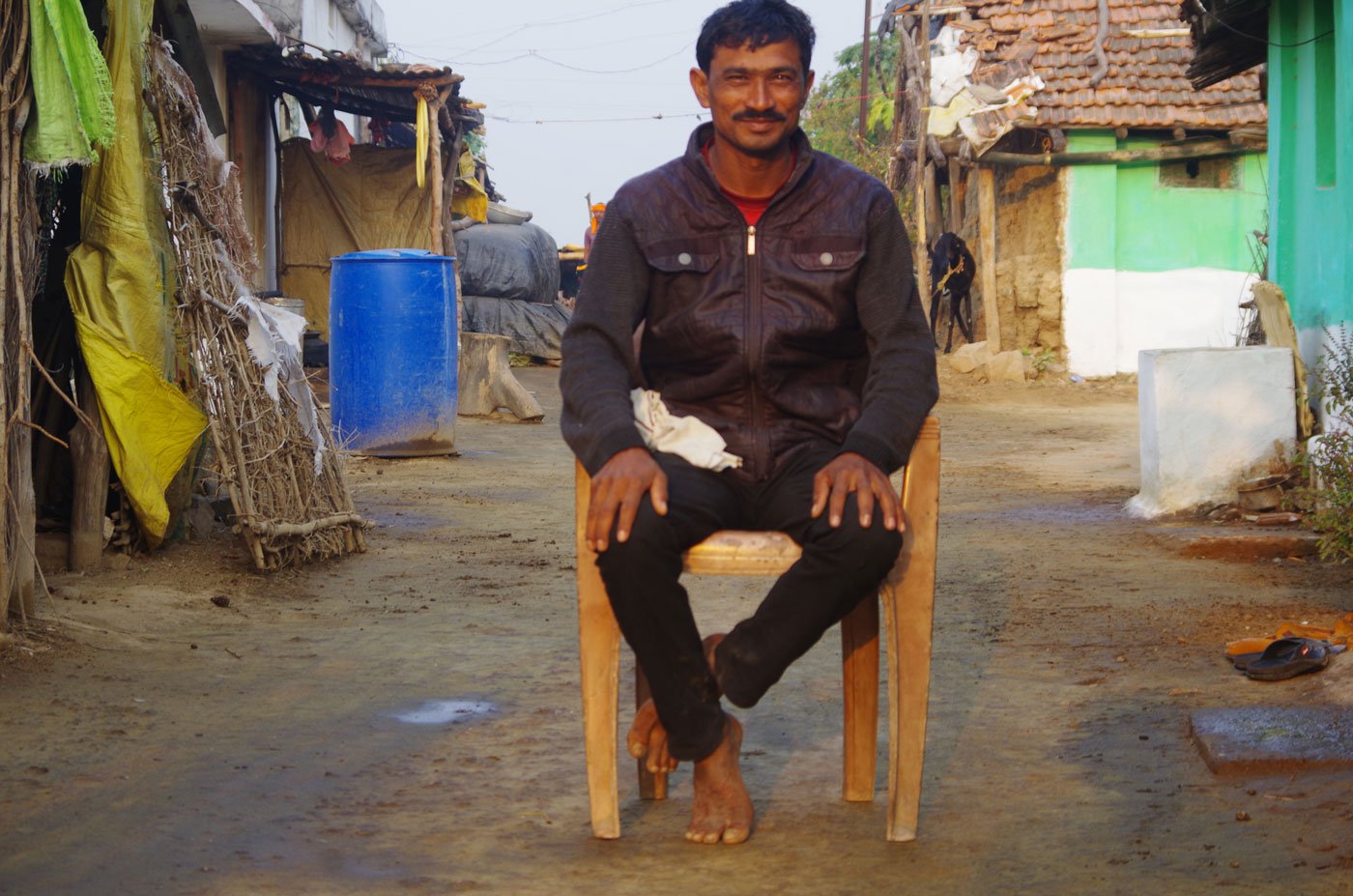
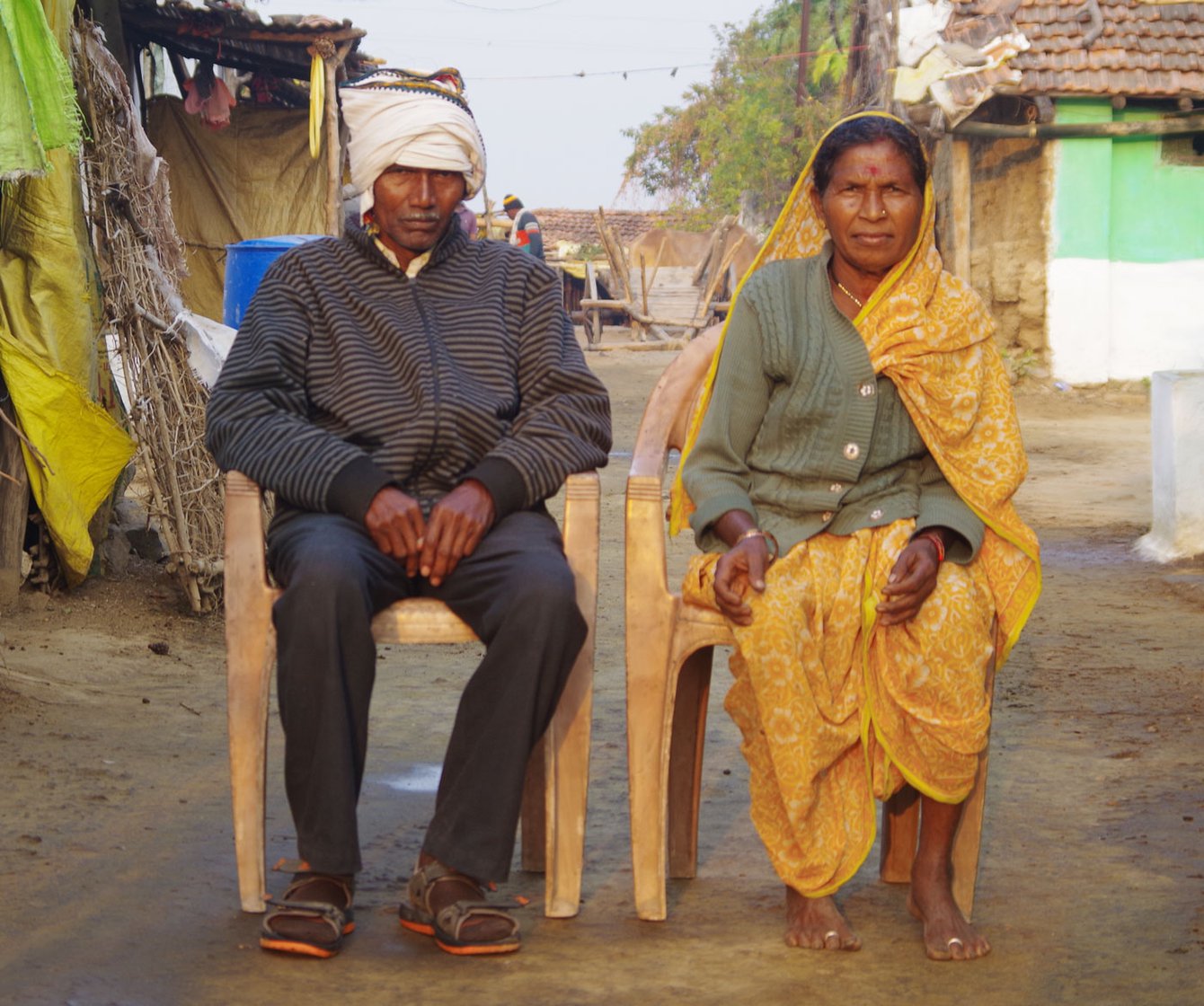
Ramchandra Dodake (left), Dadaji and his wife Shakubai (right) bang thalis ( metal plates), shouting at the top of their voices during their night vigils. They will repeat this through the night to frighten away animals
I follow Ramachandra as he takes a brisk round of the farm, carefully inspecting his crop to check if it has been touched.
We return to the village at 7 a.m. He says he’s been lucky and the night has not brought any losses.
Later in the day, Ramchandra will know if wild animals entered into any other farms last night.
I bid goodbye to my host who hands me a packet of freshly milled rice from his farm. It’s the scented variety. Ramchandra spends many nights to make sure it reaches harvest.
As we drive past the farms leaving Kholdoda behind, I see men and women quietly walking back home from farms. My adventure is over. Their backbreaking routine has just started.